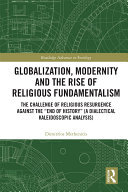
Globalization, Modernity and the Rise of Religious Fundamentalism: The Challenge of Religious Resurgence against the “End of History” (A Dialectical Kaleidoscopic Analysis) PDF
02019·0.607 MB·English
Most books are stored in the elastic cloud where traffic is expensive. For this reason, we have a limit on daily download.
Preview Globalization, Modernity and the Rise of Religious Fundamentalism: The Challenge of Religious Resurgence against the “End of History” (A Dialectical Kaleidoscopic Analysis)
Description:
The emergence of religious fundamentalism in a globalized, post-colonial world poses a significant challenge to the "End of History" narratives common in academic and non-academic literature alike. Globalization, Modernity and the Rise of Religious Fundamentalism proposes that we must seek new explanations for this phenomenon that recasts the relationship between globalization, modernity and religion. One model through which this possible is that of a dialectical kaleidoscopic methodology – one that applies a variety of theoretical tools and takes a truly multi-dimensional perspective. Through the overlapping and complementary approaches of systems theory, field theory and network theory, this book redefined the concepts of globalization, modernity and religion itself by challenging the inherent misconceptions of ethnocentric biases. It also provides a thorough historical analysis of religious systems from antiquity to the present to show the integration of modern and archaic elements within the structure of religious fundamentalism. Interdisciplinary in nature, Globalization, Modernity and the Rise of Religious Fundamentalism will appeal to students and researchers interested in fields such as geopolitics, history of race and ethnicity, postcolonialism, globalization and sociology of religion.
See more
The list of books you might like
Most books are stored in the elastic cloud where traffic is expensive. For this reason, we have a limit on daily download.
